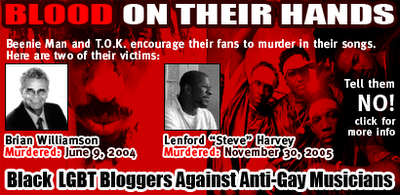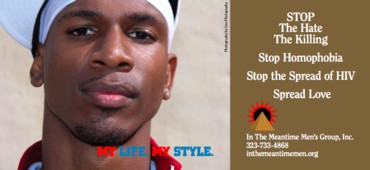Black LGBT Bloggers and LIFEBeat Reggae Gold Protests

I had been telling people that there was this explosion of black gay blogging, particularly black gay men, writing, documenting their thoughts, their travels, their intellectual, political and cultural processes, basically documenting various segments of their lives in a manner that creates a most interesting collection of digitally constructed maps employing images, color codings, links and internet constructed significations to create a record of where folks are now.
The voices are numerous and varied, from thought-provoking ruminations, great reads on the LOGO network's Noah's Arc, everyday lives and scholarly throwdowns of a number of LGBT grad students, anti-hate crime violence efforts, regular updates on black and Latino ball competitions, and more. Recently a number of Black LsGIBT Bloggers came together, virtually, but with real time impact, to protest a benefit concert organized by LIFEbeat, a music industry charity that utilizes recording artists in efforts to raise HIV/AIDS awareness and advocate HIV prevention among youths. LIFEbeat had organized the July 18th Hearts and Minds Reggae Gold Summer 2006 concert and booked artists, Beenie Man and T.O.K. who are known to advocate the murder of gays and lesbians in their songs. According to a July 12th, 2006 Black AIDS Institute press release on the subject, Beenie Man has a song “Han Up Deh,” in which he "urges listeners to lynch lesbians, singing, 'Hang chi-chi gal wid a long piece of rope,' invoking a derisive term for gay women." A 2004 Gay City News article on the No More Murder Music protests against homophobia in dancehall reggae lyrics, cites Beenie Man's hit “Battyman Fi Dead” as another example of murder-inducing lyrics, and noted that according to Amnesty International there had been "over 50 murders of gays and lesbians in Jamaica since 1982 in which homophobia was proven to be at the root of hostility. In 1996, 17 prisonerss suspected of being gay were murdered in the penal system after the Commissioner of Prisons merely suggested that condoms be distributed among the incarcerated." Homosexuality is still illegal in Jamaica, a situation that makes lesbians and gay men particularly vulnerable to human rights violations, violence, and murder with lesbians also facing the threat of rape. Human Rights Watch details many of the issues facing Jamaican LGBTs and those suspected of being queer in a 2004 report, Hated to Death:
Homophobia, Violence, and Jamaica’s HIV/AIDS Epidemic, with information on violence perpetrated by family and community members which is particularly insidious--that virulent homophobia can compel people to kill persons they've known all their lives once they learn of their sexuality.
Fortunately the efforts by on- and offline activists were effective in convincing LIFEbeat to reconsider their line up and party line that by inviting Beenie Man and T.O.K. they were inviting "dialogue" on the issue of homophobia in the Caribbean community. Although I think it was unfortunate that instead of just cancelling the two artists, LIFEBeat cancelled the entire concert citing fears of violence, after having been inundated with communication of protest (calls, letters, email and faxes). This poorly worded explanation led to a host of responses from protesters online and elsewhere decrying LIFEbeat's implication that the activists had threatened violence at the event. After a 10am Thursday, July 13th press conference in NYC in front of LIFEbeat offices held by black on- and offline activists regarding the concert, LIFEbeat responded that afternoon, with an apology to the "GLBT community" stating:
"'In our desire to do something positive within the Caribbean American community, we didn't realize the depth of the hurt in the GLBT community around the lyrics of these artists,' commented John Cannelli, Executive Director of LIFEbeat. 'Once we saw how deep and real it is, it became very clear that canceling the concert was the right thing to do.'
And with regards to the threats of violence:
"'We also want to clarify the concerns of violence we felt. Those concerns didn't stem from any threats from activists or members of the Caribbean American community. They stemmed from threatening phone calls our office received from random individuals that led to concerns for the safety of our staff and others.'"
I think this apology still somewhat of a cop out, e.g.: "we didn't realize the depth of hurt". I've been noticing this trend of deflecting accountability for some clearly willfully ignorant/prejudiced moments on the part of organizations by invoking the "I'm really sorry that what I said hurt your feelings" clause which puts all the responsibility on the offended party (i.e. "I'm sorry you're so sensitive!"). Often in these cases what really needs to be said is something along the lines of, "I'm sorry that up until this point I've chosen the inhumane path of ignoring your welfare over the acquisition of easy status, wealth, power, maintenance of the current status quo, etc. and I pledge henceforth my intention to act with greater social responsibility."
J'stheater has a detailed documentation of various aspects of this protest (including news articles, participating blogs, and Black LGBT activist statements, and various LIFEbeat responses) on July 7th, July 10th, July 12th, and July 13th, 2006.


1 Comments:
zzzzz2018.6.22
cheap nhl jerseys
pandora jewelry
michael kors outlet online
michael kors outlet online sale
coach outlet
pandora outlet
off-white clothing
air jordan 8
nike factory store
converse trainers
Post a Comment
<< Home